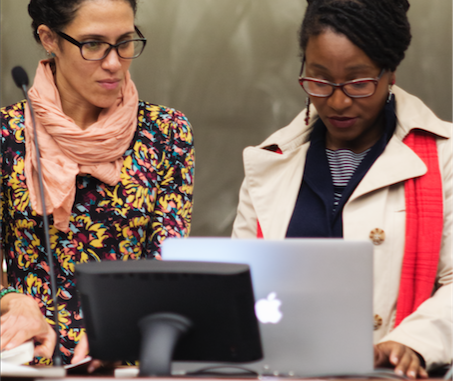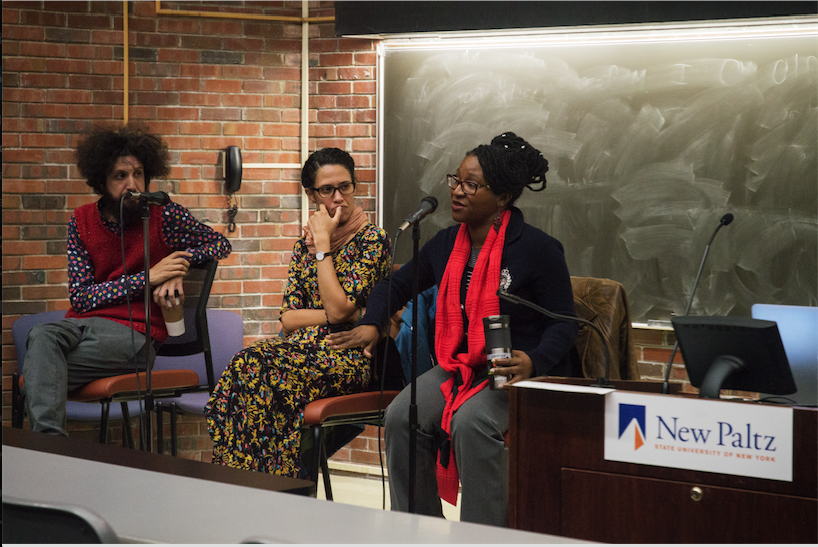
Struggling with a sense of belonging is a concept all too familiar in adolescence, when pressure to fit in with classmates and friends is at an all time high. However, when questions of citizenship arise, this pressure continues well into adulthood.
On Oct. 17 in Lecture Center 102, the College of Liberal Arts and Sciences hosted “The Politics of Belonging: Reflections from New Paltz Faculty,” a panel that explored current and past relationships between citizenship and exclusion in the United States.
The panel was segmented by three speakers: languages, literatures and cultures Assistant Professors Sharina Maillo-Pozo and César Barros as well as Black Studies Assistant Professor Nicole Carr.
Each gave a talk offering a different perspective on how citizenship is defined and how certain groups are excluded as a result: “A Few Reflections on Women of Color and Academic Citizenship,” “The Nation’s Rejected Subjects: Paradoxes of Belonging” and “Strange Fruit: The Politics of Belonging in the Trump Era,” respectively.

In his talk, Barros explored the contradictions of belonging as a citizen in the United States. To belong as a citizen entails having things in common with those around you. However, Barros claimed that this often translates into trying to erase differences between people rather than finding commonalities.
“In this sense, citizenship is a materialist practice that struggles in the name of a belonging that already exists but gets denied,” he said.
He claimed that true belonging cannot occur under this current conception of political citizenship, but rather one that acknowledges the differences in race, gender, sexuality, class, ability and culture between people instead of trying to get rid of them.
Carr dedicated her talk, titled after Billie Holiday’s “Strange Fruit,” a song about the lynching of black people, to representing a historically black view of belonging in the United States. She discussed Ku Klux Klan meetings, lynchings of black people in the Jim Crow Era and other white supremacy gatherings as venues for bonding between white citizens.
According to her, lynchings in particular established whites as a part of the American community and black people as separate from it, a precedent that is continued today by white supremacist rallies such as the one seen in Charlottesville, Virginia.
“Lynchings revealed the anti-black structure that was woven into the national framework,” she said. “Anti-blackness is a prerequisite for American citizenship.”
Finally, Maillo-Pozo shared her experiences as a “Caribeña, Latina, Dominicana, profesora de color.”
She spoke of how for many women of color entering an academic space as professors, they are often one of the first to do so. In this sense, a type of community in which they are breaching a foreign community is formed.
She also talked about how while academia is not a separate place from the rest of society, it is a space where students of color and white students can interact with one another, exploring the differences between them.
When asked about how SUNY New Paltz can make citizenship on campus more inclusive during a Q&A following the panel, Maillo-Pozo said, “You have to engage in uncomfortable conversations. In order to be citizens of this institution as non-tenure faculty as of yet, we have to be able to engage in these conversations. We need to overcome that fear, our paranoias and we need to work on diversity.”
The panel was part of this year’s Without Limits speaker series, a yearly, year-long program from the College of Liberal Arts and Sciences which selects a theme and hosts events, typically panels and lectures, which explore the theme. This year’s theme is “citizenship,” which was also chosen as a theme by the Diversity & Inclusion Council, an organization created last spring as part of the Diversity & Inclusion Plan to promote inclusivity on campus.
